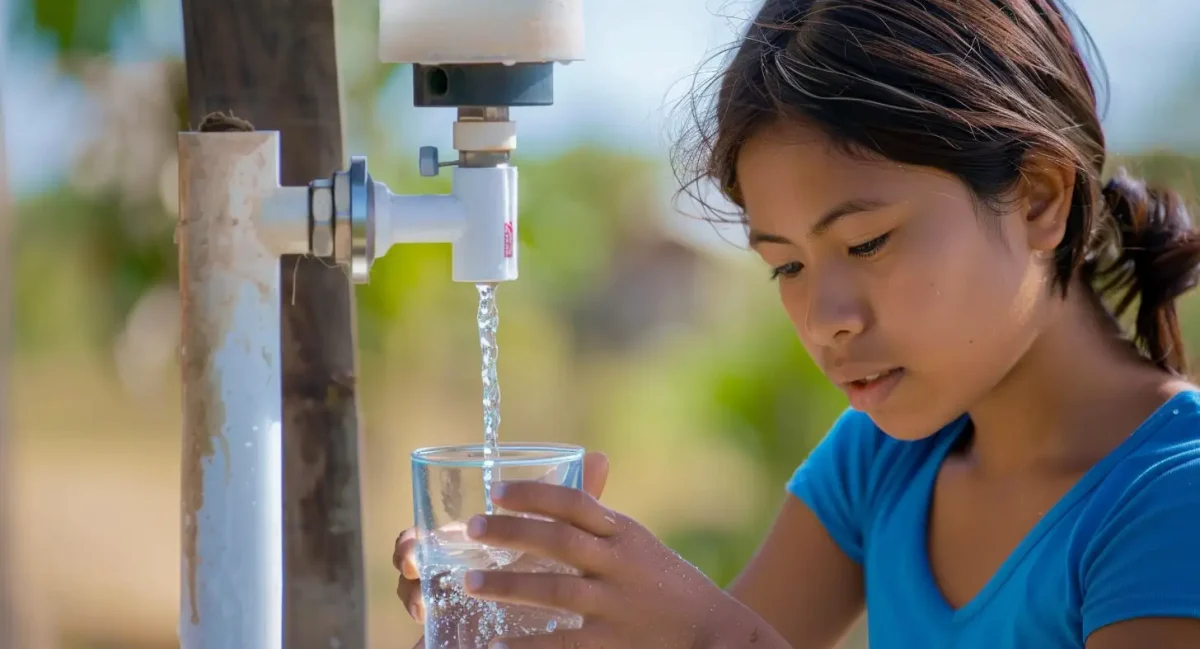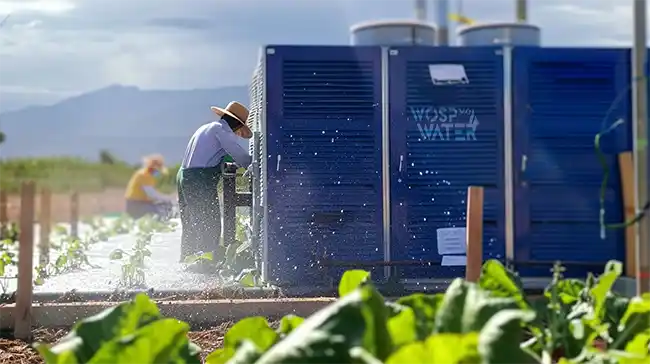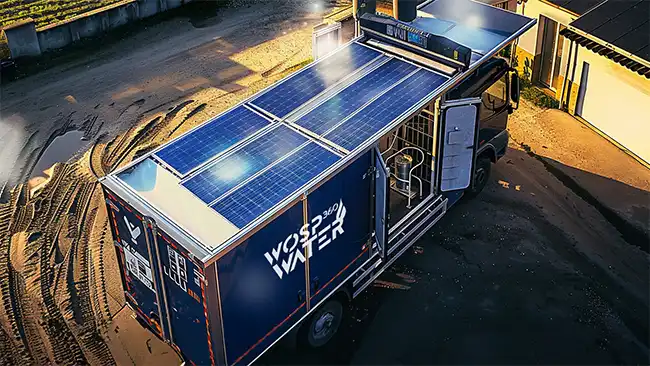Water Without Border
Atmospheric Water Generators is the Solution!
WOSP360 Water Systems Harnessing Technology to Provide Clean, PFAS and Plastic-Free Drinking Water Worldwide

Water Scarcity
Conclusion: ”Water Without Border” represents a versatile, sustainable solution to some of the world’s most pressing water issues. Whether supporting industries, vulnerable communities, or environmental initiatives, AWGs provide a reliable, eco-friendly way to produce clean water. This technology offers a clear path forward in a world where water scarcity and environmental impact are increasingly urgent concerns. With AWGs, we can ensure a secure and sustainable water future for people and the planet.
As water scarcity, pollution, and environmental concerns grow worldwide, WOSP360 Atmospheric Water Generators (AWGs) offer an innovative, sustainable solution by producing fresh water directly from the air. These devices provide clean, drinkable water for people, businesses, and even emergency situations. AWGs are a breakthrough in water technology, ideal for areas with limited water resources or contaminated water. They help a wide range of sectors and communities reduce reliance on traditional water sources and plastic bottled water.

How WOSP360 AWGs Work
AWGs capture moisture from the air, turning it into clean drinking water through a condensation process. This taps into the massive 13 trillion litres of water vapour naturally present in the atmosphere. By using this method, AWGs can provide a renewable, decentralised source of water that’s continually replenished by nature’s water cycle. This means that regardless of changing climate patterns or the depletion of natural water sources, AWGs can keep producing water, offering a reliable alternative in areas that struggle with water shortages.
Supporting Key Industries: Hotels, Waterparks, Hospitals, and Offices
- Hotels and Resorts: Hotels use large amounts of water for guest needs, pools, landscaping, and cleaning. WOSP360 AWGs allow hotels to produce fresh water onsite, cutting down on bottled water waste and reducing pressure on local water systems. This improves sustainability practices, appeals to environmentally conscious guests, and reduces costs over time. Additionally, AWGs can help supply pools and spas, ensuring water quality and availability without relying on municipal sources.
- Waterparks: Waterparks require massive amounts of water to keep slides, pools, and other attractions running. AWGs provide a continuous water source to sustain these attractions, which is particularly useful in areas prone to drought or water restrictions. This also allows waterparks to operate with fewer disruptions, even during water crises, and to reduce their reliance on traditional water source.
- Hospitals and Healthcare Facilities: Hospitals rely on consistent water for surgeries, patient care, sterilisation, and lab work. AWGs offer a reliable, uncontaminated water source for hygiene and infection control. By providing a steady water supply, AWGs help hospitals avoid disruptions due to water shortages and reduce dependence on possibly unstable municipal sources. In regions with high water costs, they also offer significant financial savings.
- Office Buildings: Offices, particularly in large urban areas, require water for general use, cooling systems, and landscaping. AWGs can supply clean drinking water for employees and keep water-cooled HVAC systems running without draining city water resources. This makes office buildings more sustainable, reduces costs, and aligns with corporate responsibility efforts. For eco-conscious businesses, AWGs also offer a way to reduce reliance on bottled water.
- Zoological Gardens: Zoos use much water for animal care, habitat maintenance, and lush landscaping. AWGs can provide clean water for animals, support extensive landscaping needs, and reduce dependency on local water resources. This aligns with many zoos’ conservation goals by promoting sustainable water use.

Addressing Challenges in Vulnerable Communities
- In Poverty-Stricken Areas: In many impoverished regions, water is not only scarce but can also be expensive. AWGs produce water from the air, giving communities an affordable and steady supply that doesn’t rely on external sources or costly municipal systems. By making water onsite, AWGs can also reduce plastic waste from bottled water, which is crucial in areas without adequate waste management systems.
- In Polluted Areas: Many communities use water sources contaminated by heavy metals, chemicals, or other pollutants. AWGs bypass these unsafe sources, providing clean, drinkable water from the air, making them ideal for areas with no access to uncontaminated water.
- In War and Conflict Zones: Water infrastructure is often damaged or inaccessible during conflicts. AWGs can be set up quickly in these regions, providing immediate water relief for refugees and displaced populations. By producing water onsite, AWGs eliminate the need for constant bottled water shipments, a major logistical challenge and environmental burden in conflict areas.
- In Areas with Social Unrest or Political Instability: AWGs offer communities in unstable areas a way to produce their water independently of centralised systems. This reduces the risk of water shortages and conflicts over limited resources, providing a stable water supply even when local infrastructure is compromised.
Preventing Plastic Pollution from Bottled Water
One of the big environmental benefits of AWGs is their ability to reduce the need for bottled water. By providing clean water directly onsite, AWGs eliminate plastic waste from single-use water bottles, which often result in landfills or pollute rivers and oceans. Producing water locally with AWGs also reduces the carbon footprint tied to the transportation of bottled water. In the long term, AWGs contribute to a cleaner environment and support the transition to a more sustainable, circular economy.

Enhancing Emergency Preparedness and Sustainability Goals
Across all sectors, AWGs provide essential benefits, from emergency preparedness to environmental sustainability. By generating water onsite, businesses and communities reduce dependency on traditional water sources, cut water costs, and have a backup during shortages or crises. AWGs help organisations meet global sustainability goals by using renewable resources, reducing plastic waste, and protecting local ecosystems.
WOSP360 WATER – GLOBAL WATER SCARCITY & RESTRICTION
Today’s high need for drinking water will only increase rapidly in the next 2-5 years. After that, if not earlier, the market demand will rise sharply as global climate change and armed conflicts have proven the need for our services and solutions to triple in this decade alone. Water scarcity is one matter; the other is globally breaching the water cycle.

Want to kickstart a project?
Embark on the journey to turn your ideas into reality by kickstarting your project with us. Our team is geared up and ready to breathe life into your vision, offering a collaborative space where creativity and innovation converge. From concept to execution, we’re here to guide you through every step of the process.
